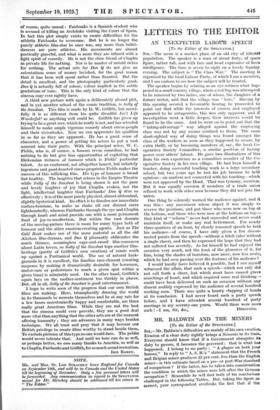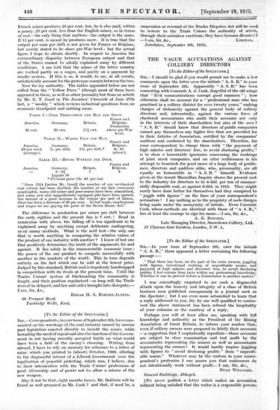MR. BALDWIN AND THE MINERS
[To the Editor of the SPECTATOR.] Sm,—Mr. Baldwin's difficulties are mainly of his own creation. Evasion of a clear duty rightly brings a Nemesis in its train. Everyone should know that if a Government abrogates its duty to govern, it becomes the governed : that is what has happened. I belong to no party : " A plague on both your houses." In reply to " A. S. B.'s " statement that the French and Belgian miner produces 25 per cent. less than the English miner—is this estimate based on a pre- or post-War standard of comparison ? If the latter, has he taken into consideration the condition in which the mines were left after the German occupation ? Meanwhile he will find both of his conclusions challenged in the following Tables. But, taking the figure as Correct, your correspondent overlooks the fact that if the French miner produces 25 per cent. less, he is also paid, within a penny, 25 per cent. less than the English miner, so in terms of cost—the only thing that matters--the output is the same. If 15 per cent. is meant he produces more. It is true that the output per man per shift is not given for France or Belgium, but merely stated to be above pre-War level : but the actual figure I. hope to obtain shortly. In respect to America the extraordinary disparity between European output and that of the States cannot be wholly explained away by different conditions. I am told that the mines of the latter country are worked partly on a wages, and partly on a payment by results system. If this is so, it would, to me, at all events, satisfactorily account for the grotesque margin between the two.
Now for my authority. The tables appended below are not culled from the " Yellow Press " (though most of them have appeared in these, as well as other journals) but from an article by Mr. E. T. Good in The Investors' Chronicle of June 27th last, a " weekly " which reviews industrial questions from an economic standpoint and nothing more.
TABLE I.-COAL PRODUCTION PER MAN PER SHUT.
France and America. Germany. Britain. Belgium. Production
80 cwt. 20. cwt. 171 cwt. above pm-War
level.
America. Germany. Britain.
8-81 7 Lignite 10 * Pit-head price 13s. 6d. per ton.
" Since 1914 [writes Mr. Good] the number of our mechanical coal cutters has been doubled, the number of our face conveyers quadrupled, many old mines and poor seams have been abandoned, and many new and magnificently equipped pits have been opened, but instead of a good increase in the output per unit of labour, there has been a decrease of 20 per cent. In lost trade, employment and wages we are paying the price of the Seven Hours Act."
The difference in production per miner per shift between the early eighties and the present day is 7 cwt. ! Read in connexion with above, the falling off is too significant to be explained away by anything except deliberate malingering, or ea' canny methods. What is the acid test—the only one that is worth anything in comparing the relative values of the product of one industry with another ? I know of but one that positively determines the truth of the arguments for and against. It lies solely in the unanswerable economic issue : the power of the one product to compete successfully with another in the markets of the world. This in turn depends entirely on the fact which can be sold at the lowest price.
Judged by this standard, British coal is hopelessly handicapped in competition with its rivals at the present time. Until the Trades Unions' system of blackmailing the community is fought, and their position regularised—so long will the Trade revival be delayed, and law and order brought into disrepute.—
TABLE II.----WAGES PAID PER MAN.
America. Germany. £8 per week 7s. per shift. 1 ls. per shift.* (average). France and Britain. Belgium.
88. 4c1. (about).
TABLE III.-HOURS WORKED PER DIEM.
France and Belgium.
8
I am, Sir, &c., 36 Prospect Road, Tunbridge Wells, Kent. EDGAR H. S. BARNES-AUSTIN.











































 Previous page
Previous page